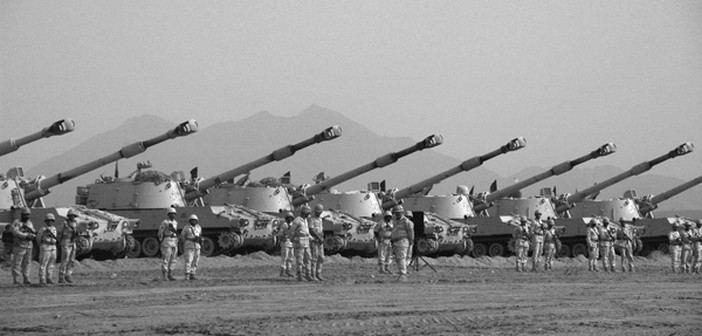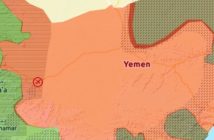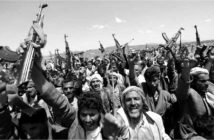The civil war in Yemen has entered its tenth month and there is no indication signaling to an eminent end of this absurd and devastating conflict. The Saudi-led military intervention has not yet been able to reinstate the legitimate government led by President Abd Rabo Mansour Hadi, regardless of him having already returned to the homeland along with several ministers. Whereas the Houthi-Saleh coup has been foiled, the rebellion has not been put down yet.
A prolonged civil war turns out to be inevitable given that the warring parties have failed to reach a peace agreement and no party has been capable to defeat the other on the ground. That means Yemenis have to brace themselves for more battles and troubles ahead.
The conflicting interests are one of the main reasons beyond the current military and political impasse the county has been struggling with. There is deep division among the members of both sides of the warring parties.
Let us begin with the rebel camp. The Houthi-Saleh alliance is nothing more than a short-term marriage of convenience. Not only is there no common ground between the two factions, but also their motives is in stark contrast. Saleh fought several battles against the Houthis, killing hundreds of them. He is fully aware that they will never forgive him. For their part, the Houthis are well familiar with Saleh’s cunning maneuvers. They do know that he just intended to capitalize on their advancement to extort the Saudis as he often did in the past.
Each faction has repeatedly and vehemently denied to be aligned with the other. They do understand that it is hard to justify such a coalition without undermining their own credibility. Yet, as power seekers, both Saleh and Abdulmalik Al-Houthi thought pragmatically and acted evasively in a bid to make the best of their temporary cooperation to serve their own personal agendas.
For the government camp, conflicting interests have largely undermined the military campaign progress on several frontlines. Nationally, the political forces aligned with the government have different agendas. Likewise, some of the Arab coalition member states have contradicting agendas. For instance, while the United Arab Emirates (UAE) are strongly opposing the Muslim Brotherhood, the state of Qatar is emphatically supporting them. For this reason, the coalition has been reluctant about arming the local resistance fighters in some governorates, particularly in Taiz.
The UAE military officials explicitly blamed the Al-Islah Party (Muslim Brotherhood) for the slow advancement of the pro-government forces in Taiz. Meanwhile, the latter argued that they are under-funded and armed, because some member states of the coalition oppose the idea of equipping the local fighters with sophisticated and quality weapons.
The Arab nationalist and left-wing parties also have been concerned about arming the Islamist militants (including Muslims Brotherhood). Large portions of the Yemeni people view the militiamen of the Al-Islah Party as alarming as the Houthi militias. Thus, national efforts have not been joined together to fight rebels.
The southern separatists’ main interest has been at odds with Hadi’s government policy which is strongly supporting unity and rejecting partition. Therefore, once the Houthi fighters were pushed out of Aden, southerners have made no efforts to chase them all the way back to Sana’a, or at least to Taiz. Indeed, southerners wish to see northerners fighting each other so that they can go on creating their own independent territory.
Among northerners a conflict of interest has clearly emerged between Saleh supporters and the Houthi followers. In fact, not all northern tribesmen are truly supporting the Houthis; the vast majority of tribesmen supports Saleh and prefers him or his elder son, Ahmed Ali, to Abdulmalik Al-Houthi. Many tribesmen went fighting along with the Houthis in response to Saleh’s orders. The reason is that though northern tribes are Zaidis they do not actually like to bring the Imamates backs into ruling positions because of bad track record as rulers.
War–related torment
The death toll since the beginning of the Saudi-led military intervention has exceeded 6,000 and recorded injuries estimated at 27,000. These official tolls do not include premature deaths because of lacking access to medication for chronic illnesses such as diabetes, kidney failure and cancer. Large numbers of casualties went unreported.
Health System at the brink of collapse
The World Health Organization (WHO) reported that more than 15 million Yemenis (over 58% of the population, total of 26 million) lack access to medical services, 20 million (77%) “lack access to safe water and sanitation, and conditions are ripe for a major disease outbreak”.
Recently, the WHO warned that health services are on the edge of collapse unless Yemen’s health system receives sufficient help immediately, otherwise it is going to collapse completely. A quarter of medical facilities do not operate, lacking water, electricity, medical supplies and salaries for their staff. More than 6000 health facilities have been shut down since March and more than 99 medical facilities where damaged or destroyed during the current war in Yemen, according to the WHO.
The blockade imposed by the Saudi-led coalition has further exacerbated food supplies shortages. As a result, prices of basic foods are skyrocketing. Since March prices have jumped up on average by 57% for wheat, 74% for onions, 325% for cooking gas, 287% for diesel and 274% for petrol. In the frontline governorates such as Taiz, Al-Baidha, Marib, Sa’ada and Jawf, the prices are much higher.
Famine Knocking on the Door
The United Nations have repeatedly warned of an eminent famine and continue to appeal for immediate humanitarian aid to prevent the looming starvation. The UN is desperately trying to help through its agencies, mainly the World Food Programme (WFP). It appealed for $1.6 billion for its emergency mission in Yemen this year. Yet only 49% funded by the end of November. The WFP has targeted only 11.6 million people, while some 21.2 million are in need of some form of humanitarian aid, according to the UN reports. About half a million children are facing life-threatening malnutrition, according to the WHO.
Water shortage is more acute than that of food because the largest part of water supplies are provided by pumps, which operate on diesel.
Security Situation Alarming
The ongoing conflict has seriously distracted the already ineffective security bodies in the country; creating unprecedented power vacuum which is an ideal environment for the terrorist groups to operate freely. The affiliates of the two notorious terrorist organizations: Al-Qaeda and Islamic State have taken the advantages of current civil war to recruit, train and carry out terrorist operations. The recent terrorist attacks in Aden, including the assassination of the newly appointed governor of Aden, senior judge and brief control over two towns nearby Aden should serve as alarming signs.
Conflicting interests always give rise to long standing dilemmas in peace and war times. Yemen’s history tells us repeatedly that peace deals are only reached once warriors got too tired of fighting. Obviously, realities on the ground indicate that the warring factions are still capable and willing to keep on battling each other.
But ordinary people have already been too exhausted to afford such an absurd war.




